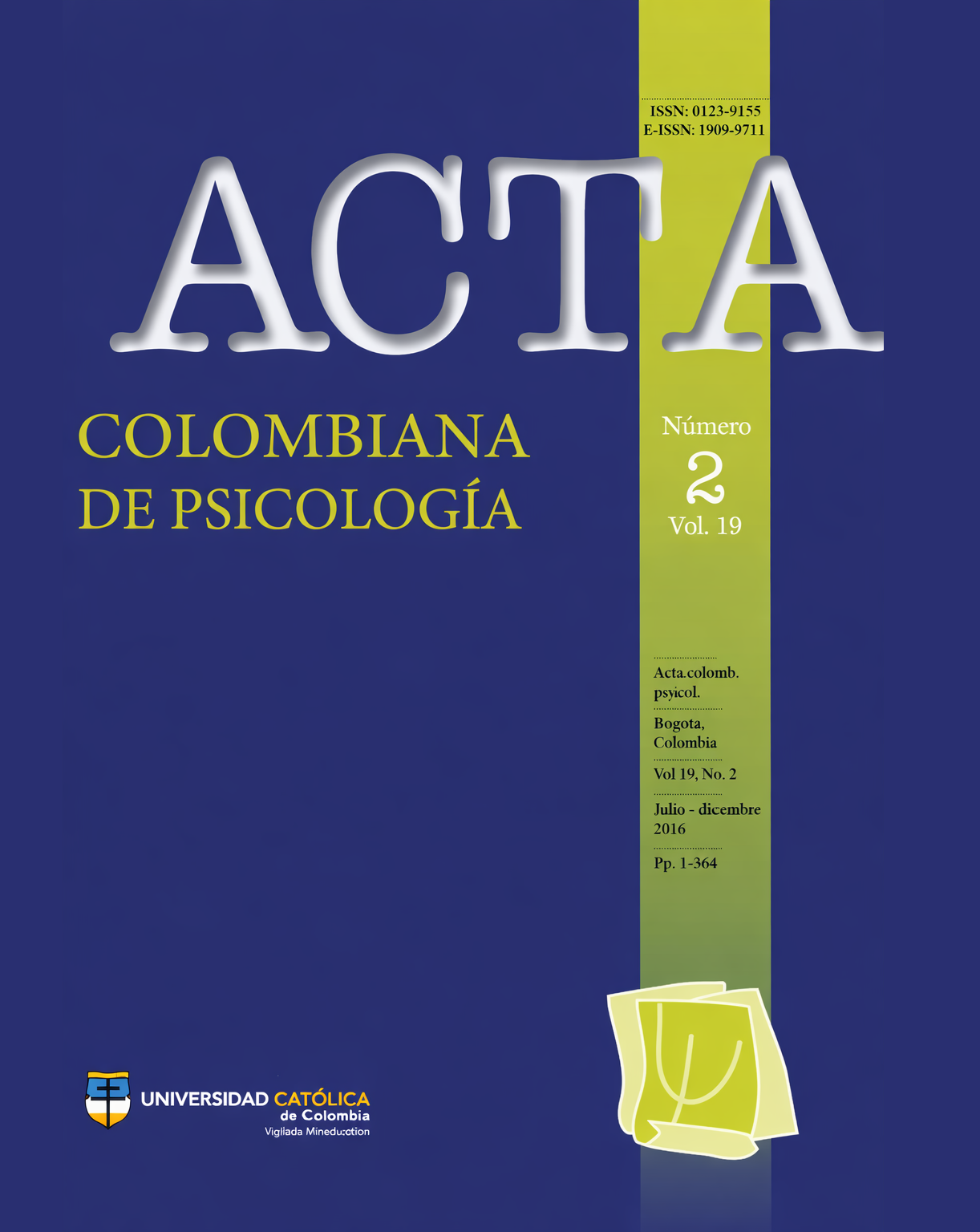Los autores que publiquen en esta Revista aceptan las siguientes condiciones:
Acta Colombiana de Psicología se guía por las normas internacionales sobre propiedad intelectual y derechos de autor, y de manera particular el artículo 58 de la Constitución Política de Colombia, la Ley 23 de 1982 y el Acuerdo 172 del 30 de Septiembre de 2010 (Reglamento de propiedad intelectual de la Universidad Católica de Colombia)
Los trabajos publicados en la revista se registran bajo una licencia de Creative Commons Reconocimiento-NoComercial-CompartirIgual 4.0 Internacional, que permite a terceros utilizar lo publicado siempre que mencionen la autoría del trabajo y a la primera publicación en esta Revista.
Resumen
El objetivo del estudio fue identificar las asociaciones entre fortalezas del carácter y satisfacción con la vida y las diferencias de medias entre el sexo y la edad de los participantes. La muestra estuvo conformada por 186 estudiantes universitarios, 62,9% de sexo femenino, con edades entre los 17 y 45 años (M=21,55; DP=4,79), provenientes de dos estados brasileños. Los instrumentos utilizados fueron la Escala del Fortalezas del Carácter y la Escala del Satisfacción con la Vida. Los resultados mostraron diferencias significativas en relación con el sexo, ya que las mujeres tuvieron puntuaciones más altas en cuatro fortalezas del carácter. No se encontraron diferencias significativas en cuanto a la edad de los participantes. Acerca de las correlaciones entre los constructos estudiados, se observó que la vitalidad, la gratitud, la esperanza, la perseverancia y el amor fueron las fortalezas más relacionadas con la satisfacción con la vida, en magnitudes moderadas. Los resultados mostraron que los individuos con puntuaciones altas en esperanza, vitalidad, gratitud, amor, curiosidad, perseverancia e inteligencia social, tienden a vivir una vida más satisfactoria.
Palabras clave

Citas
Bailey, T. C., & Snyder, C. R. (2007). Satisfaction with life and hope: A look at age and marital status the Psychological Record, 57, 233-240.
Brdar, I., Anic´, P., & Rijavec, M. (2011). Character strengths and well-being: Are there gender differences’ In: I. Brdar (ed.), the human pursuit of well-being: A cultural approach (pp. 145-156).
Dordrecht, NL: Springer. Brdar, I. & Kashdan, T. B. (2010). Character strengths and wellbeing in Croatia: An empirical investigation of structure and correlates. Journal of Research in Personality, 44, 151-154. doi: 10.1016/j.jrp.2009.12.001.
Cohen, J. (1992). A power primer. Psychological bulletin, 112(1), 155-159. doi: org/10.1037/0033-2909.112.1.155.
Dela Coleta, J. A., Lopes, J. E. F., & Dela Coleta, M. F. (2012). Felicidade, bem-estar subjetivo e variáveis sociodemográficas, em grupos de estudantes universitários. Psico-uSF, 17(1), 129-139.
Diener, E., Emmons, R., Larsen, R., & Griffin, S. (1985). The satisfaction with life scale. Journal of Personality Assessment, 49, 91-95.
Diener, E., & Seligman, M. E. P. (2002). Very happy people. Psychological Science, 13, 80-83. doi: 10.1111/1467-9280.00415.
Diener, E., Suh. E. M., Lucas, R. E. & Smith, H. L. (1999). Subjective well-being: three decades of progress. Psychological bulletin, 125(2), 276-302.
Harzer, C., & Ruch, W. (2015). The relationships of character strengths with coping, work-related stress, and job satisfaction. Frontiers in Psychology, 6,165. doi: 10.3389/fpsyg.2015.00165
Hutz, C. S. (2014). Avaliação em psicologia positiva. Porto Alegre, RS: Artmed.
Kashdan, T. B., & Steger, M. F. (2007). Curiosity and pathways to well-being and meaning in life: Traits, states, and everyday behaviors motivation and emotion, 31, 159-173. doi: 10.1007/s11031-007-9068-7.
Lambert, N. M., Fincham, F. D., Stillman, T. F., & Dean, L. R. (2009). More gratitude, less materialism: The mediating role of life satisfaction the Journal of Positive Psychology, 4(1), 32-42. doi: 10.1080/17439760802216311.
Littman-Ovadia, H., & Lavy, S. (2012). Differential ratings and associations with well-being of character strengths in two communities. Health Sociology Review, 21(3), 299-312. doi: 10.5172/hesr.2012.21.3.299.
Littman-Ovadia, H., & Steger, M. (2010). Character strengths and well-being among volunteers and employees: Toward an integrative model the Journal of Positive Psychology, 5(6), 419-430. doi: org/10.1080/17439760.2010.516765.
Martínez-Martí, M. L., & Ruch, W. (2014). Character strengths and well-being across the life span: Data from a representative sample of German-speaking adults living in Switzerland. Frontiers in Psychology, 5, 1253. doi: 10.3389/fpsyg.2014.01253.
Noronha, A. P. P., & Barbosa, A. J. G. (2013). Escala de Forças de Caráter. Relatório técnico não publicado. Universidade São Francisco. Noronha, A. P. P., Dellazzana-Zanon, L. L., & Zanon, C. (2015). Internal Structure of the Characters Strengths Scale in Brazil. Psico-uSF, 20(2), 229-235. doi: 10.1590/141382712015200204
Park, N., Peterson, C. & Seligman, M. E. P. (2004). Strengths of character and well-being. Journal of Social and Clinical Psychology, 23(5), 603-619. doi: 10.1521/jscp.23.5.603.50748
Park, N., Peterson, C., & Sun, J. K. (2013). La Psicología Positiva: Investigación y aplicaciones terapia Psicológica, 31(1), 11-19. doi: 10.4067/S0718-48082013000100002
Peterson, C., Ruch, W., Beermann, U., Park, N & Seligman, M. E. P. (2007). Strengths of character, orientations to happiness, and life satisfaction. Journal of Positive Psychology, 2(3), 149-156. doi: 10.1080/17439760701228938
Peterson, C., & Seligman, M. E. P. (2004). Character strengths and virtues: A handbook and classification. Washington, DC: American Psychological Association.
Proctor, C., Maltby, J., & Linley, P. A. (2011). Strengths use as a predictor of well-being and health-related quality of life. Journal of Happiness Studies, 12, 153-169. doi: 10.1007/s10902-009-9181-2.
Seligman, M. E. P., Steen, T. A., Park, N., & Peterson, C. (2005). Positive psychology progress: Empirical validation of interventions. American Psychologist, 60(5), 410-421.
Zanon, C., Bardagi, M. P., Layous K. & Hutz, C. S. (2014). Validation of the Satisfaction with Life Scale to Brazilians: Evidences of Measurement Noninvariance Across Brazil and US. Social indicators Research, 119(1), 443-453. doi: 10.1007/s11205-013-0478-5.



































